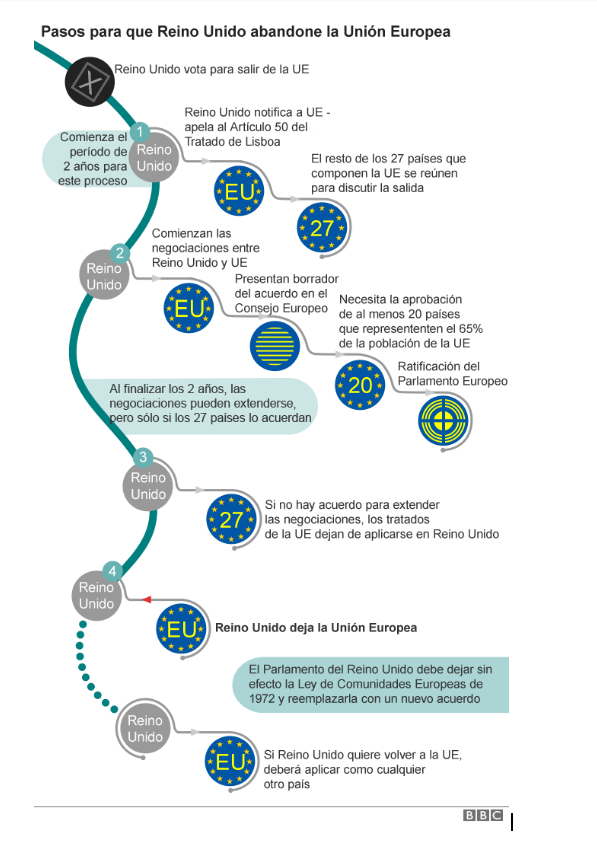Once the mood is settled and the astonishment over the unexpected results of Brexit is over, it is necessary to evaluate, in broad strokes, the future scenarios in view of the probable departure from the United Kingdom of the European Union.
Before describing the consequences and effects, it is necessary to clarify certain points that are determinant:
- The referendum, as a consultation, does not have immediate application. Now is the beginning of the regular process of abandonment of the EU, in accordance with the parameters established by the body and applicable to member countries.
- In addition, it should be noted that the departure of the United Kingdom from the EU does not affect the monetary unit, as long as it did not belong to the euro.
- To date, the departure of an EU member country should be implemented under Article 50 of the Lisbon Treaty. For that:
- United Kingdom should notify the European Council of its intention to leave the bloc.
- Once notified, the procedure is triggered and the negotiation process begins to determine the relationships and treaties with each of the member countries.
- The document agreed in this first stage must be approved by the European Parliament and signed by the European Council. For this process a term of 2 years is established.
- If no agreement is reached, the negotiating deadline for bilateral agreements may be extended by the Council.
- Once the document was approved, the withdrawal from the EU would take effect.
However, companies that manage medium- and long-range projects in the United Kingdom already plan action plans to relocate operations and workers; While designing new mobility strategies and investment plans to relocate their expatriates.

Possible changes
If the exit of the EU is carried out, one of the areas susceptible to present legal adjustments, is immigration. Laws relating to the free movement of workers, tourists and students between Europe and the United Kingdom will necessarily be redefined. In this case, companies will have to adjust to the new work visa management policy and prepare for the transition, so that they can control - as far as possible - the economic impact on the business.
In the case of foreign students, new requirements for obtaining long-stay visas will be defined. On the other hand, the subsidies in Universities and Centers of Studies for belonging to the EU would also be affected.
Temporary and long-term residence permits will likewise be subject to bilateral agreements with each country. And finally, the system of social assistance and the right to the National Health System, will also be affected and must respond to agreements that are negotiated with each of the EU member countries.
Economic impact
Economic forecasts have already been put on the table and risk analysts venture with projections. BlackRock estimates that leaving the UK would cost the City about 100,000 jobs, assuming major companies plan to move to another Eurozone city.
The manager Deutsche Asset Management estimates that in 2016 the growth of the United Kingdom may fall from 2% to 1.5%. The British Treasury, for its part, expects GDP to shrink by between 3.6% and 6% in the next two years and a depreciation of the pound of between 12 and 15%. With regard to employment, its projection points to an increase of between 520,000 and 800,000 unemployed in the same period.
The visible consequences
Despite the uncertainty regarding bilateral agreements and their level of involvement in the short and medium term; What has begun to be noticed a few days after the referendum, is the radicalization of political positions and social tension resulting from a conservative and independence speech, led by Nigel Farage and his party KUIT. However, the consequences escape from the legal and geopolitical scope, to be measured in the social field.
It is important to mention that there are currently about 200,000 Spaniards and about 2.8 million European citizens who reside, study or work on British soil and who will suffer in one way or another the economic, legal and social impact that Brexit represents.
To date and after a week of consultation, the scenario is uncertain, there are no concrete and clear plans to face the exit and has been put on the table - including the possibility of reversing. The argument is to appeal to a new "democratic validation," at least so says the current Minister of Health, Jeremy Hunt.
Faced with this scenario and until Article 50 of the Treaty of Lisbon is activated and the start-up is launched, actions to confront the consequences are, to say the least, hasty.
